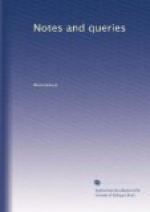“Of all writers, none exceed Shakspeare in logical correctness and nicety of expression. With a vigour of though and command of language attained by no man besides, it is fair to conclude, that he would not be guilty of faults of construction such as would disgrace a schoolboy’s composition.”
With this canon so ably laid down, and these remarks so apposite, MR. HICKSON, taking up the weak point which Mr. SINGER had slurred over, observes—
“Drink up is
synonymous with drink off, drink to the dregs.
A
child taking medicine is urged
to ‘drink it up.’”
Ay, exactly so; drink up what? the medicine; again a defined quantity; dregs and all,—still a definite quantity.
MR. HICKSON proceeds:
“The idea of the passage
appears to be that each of the acts should go
beyond the last preceding
in extravagance.
’Woo’t
weep? woo’t fight? woo’t fast? woo’t
tear thyself?
Woo’t drink
up eisell?’
and then comes the climax—’eat a crocodile?’ Here is a regular succession of feats, the last but one of which is sufficiently wild, though not unheard of, and leading to the crowning extravagance. The notion of drinking up a river would be both unmeaning and out of place.”
From this argument two conclusions are the natural consequences: first, that from drinking up wormwood,—a feat “sufficiently wild but not unheard of,” to eating a crocodile, is only a “regular succession of events;” and, secondly, that the “crowning extravagance,” to eat a crocodile, is, after all, neither “unmeaning” nor “out of place;” but, on the contrary, quite in keeping and in orderly succession to a “drink up” of the bitter infusion.
MR. SINGER (vol. ii., p. 241.) says:
“Numerous passages of our
old dramatic writers show that it was a
fashion with the gallants of the time to do some
extravagant feat as
proof of their love.”
I quite agree with him, if he mean to say that the early dramatists ascribe to their gallants a fashion which in reality belongs to the age of Du Gueslin and the Troubadours. But Hamlet himself, in the context of the passage in question, gives the key to his whole purport, when, after some further extravagance, he says:
“Nay,
an thoul’t mouth,
I’ll rant as well as thou.”
That being so, why are we to conclude that each feat of daring is to be a tame possibility, save only the last—the crowning extravagance? Why not also the one preceding? Why not a feat equally of mere verbiage and rant? Why not a river?
Adopting MR. HICKSON’S canon of criticism, the grammatical construction of the passage requires that a definite substantive shall be employed to explain the definite something that is to be done. Shakspeare says—
“Woul’t drink up esile?"[9]




